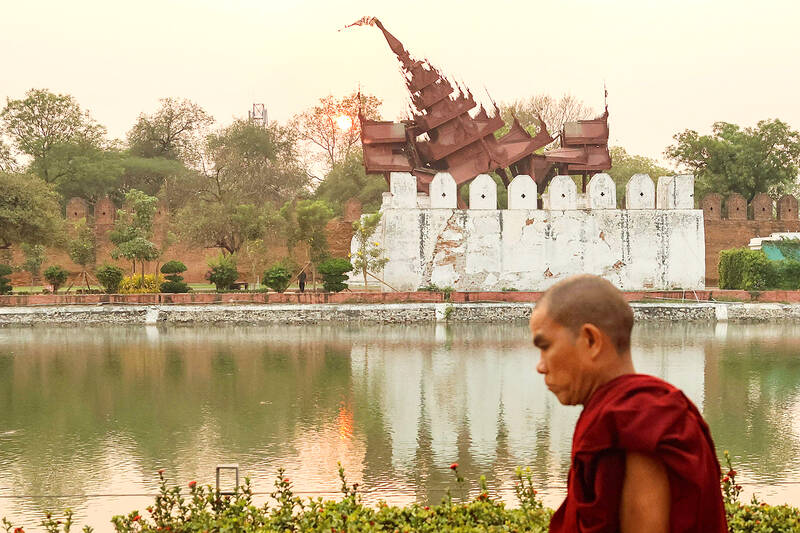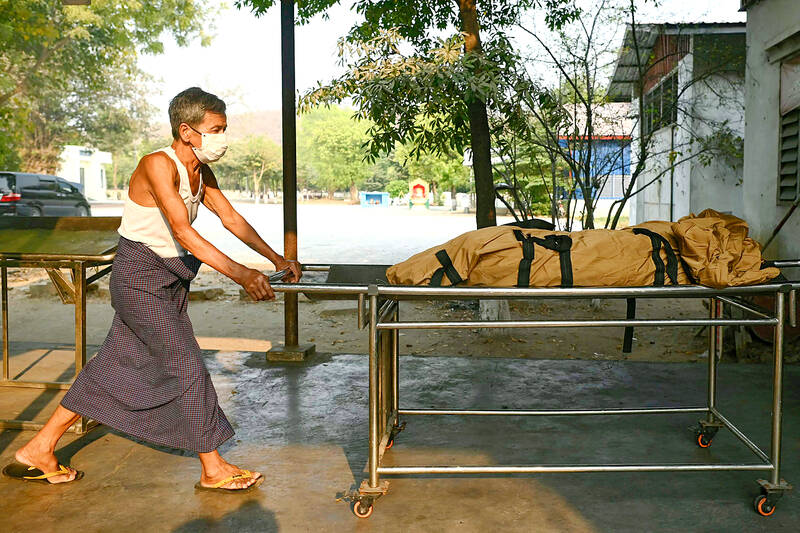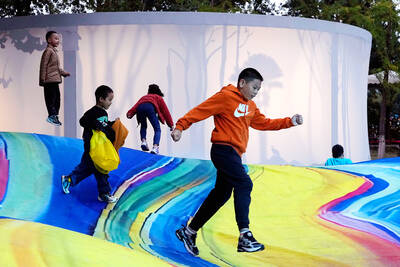The baby was born in the aftermath of Myanmar’s earthquake and given to the flames of Buddhist funeral rites two days later, too young to have been named.
The child’s pregnant mother was knocked over by the force of the quake while working in a paddy field, said grandmother Khin Myo Swe, and gave birth the following day.
The baby was brought to a hospital in Mandalay to be incubated, but died on Monday.

Photo: AFP
“We are all living in hardship,” wept Khin Myo Swe as an ambulance worker gently cradled the little body before a Buddha statue decorated with flowers, then took it away to be cremated.
Three days after a 7.7-magnitude earthquake struck central Myanmar the death toll has hit 2,056, with more still buried in the remnants of ruined buildings in the nation’s second city.
Since the quake hit Friday, ambulances have been bringing the remains of the dead to the crematorium in the Kyar Ni Kan neighborhood on the outskirts of Mandalay.

Photo: AFP
‘WHAT OTHERS CANNOT’
Some 300 bodies have been delivered in total, more than 100 on Sunday alone, forcing them to work six hours beyond their usual closing time.
Some vehicles peel in with frenzied haste. A crew of men say they are bringing a 16-year-old female quake victim.
The bundle of cloth they deposit before the crematorium’s sliding metal door is much shorter than a typical teenage girl and one man retches as they bundle back in the van.
They do not speak as they leave the crematorium lot — eager to ferry her clothing home to bring her soul back to her family.
Nay Htet Lin, the head of another four-man crew who have brought in around 80 bodies since the quake, said: “On the first day of the earthquake, we helped injured people get to hospital. On the second day, we had to carry only dead bodies.”
CLEANSING FIRE
Cremation is a core tenet of the Buddhist faith, with adherents believing it frees the soul from the body and facilitates rebirth in a new life.
In some Asian cultures, those who deal with the dead are regarded as outcasts, on the margins of society.
But Nay Htet Lin said it was “noble work.”
“We are doing what other people cannot,” he said. “We will have a good next life.”
One 15-year veteran crematorium staffer had no regrets over his choice of workplace, even as he witnessed a parade of anguish.
“Everyone is coming here with their sad feelings, with their suffering,” said the 43-year-old, asking for anonymity as he was not authorized to speak to the media. “When they come here I also work for them.”
FOOD OFFERING
Much of the focus of rescue teams has been in urban Mandalay where apartment complexes have been flattened, a Buddhist religious complex eviscerated and hotels crumpled and twisted into ruins. At some disaster sites the smell of rotting bodies is unmistakable.
Khin Myo Swe’s short-lived grandchild was the 39th body delivered on Monday. She said the baby’s mother had not yet been told of her child’s death. It costs less than US$3 at free-market rates to cremate an adult in the diesel-fueled facility, and half that for an infant.
“I had to lie to my daughter, telling her I left the baby in hospital,” said Khin Myo Swe, 49.
“If I tell her now I’m worried the shock would kill her too. I will send food as an offering to the monastery for the baby’s soul.”

The Taipei Times last week reported that the rising share of seniors in the population is reshaping the nation’s housing markets. According to data from the Ministry of the Interior, about 850,000 residences were occupied by elderly people in the first quarter, including 655,000 that housed only one resident. H&B Realty chief researcher Jessica Hsu (徐佳馨), quoted in the article, said that there is rising demand for elderly-friendly housing, including units with elevators, barrier-free layouts and proximity to healthcare services. Hsu and others cited in the article highlighted the changing family residential dynamics, as children no longer live with parents,

Oct 20 to Oct 26 After a day of fighting, the Japanese Army’s Second Division was resting when a curious delegation of two Scotsmen and 19 Taiwanese approached their camp. It was Oct. 20, 1895, and the troops had reached Taiye Village (太爺庄) in today’s Hunei District (湖內), Kaohsiung, just 10km away from their final target of Tainan. Led by Presbyterian missionaries Thomas Barclay and Duncan Ferguson, the group informed the Japanese that resistance leader Liu Yung-fu (劉永福) had fled to China the previous night, leaving his Black Flag Army fighters behind and the city in chaos. On behalf of the

I was 10 when I read an article in the local paper about the Air Guitar World Championships, which take place every year in my home town of Oulu, Finland. My parents had helped out at the very first contest back in 1996 — my mum gave out fliers, my dad sorted the music. Since then, national championships have been held all across the world, with the winners assembling in Oulu every summer. At the time, I asked my parents if I could compete. At first they were hesitant; the event was in a bar, and there would be a lot

Smart speakers are a great parenting crutch, whether it be for setting a timer (kids seem to be weirdly obedient to them) or asking Alexa for homework help when the kids put you on the spot. But reader Katie Matthews has hacked the parenting matrix. “I used to have to nag repeatedly to get the kids out of the house,” she says. “Now our Google speaker announces a five-minute warning before we need to leave. They know they have to do their last bits of faffing when they hear that warning. Then the speaker announces, ‘Shoes on, let’s go!’ when